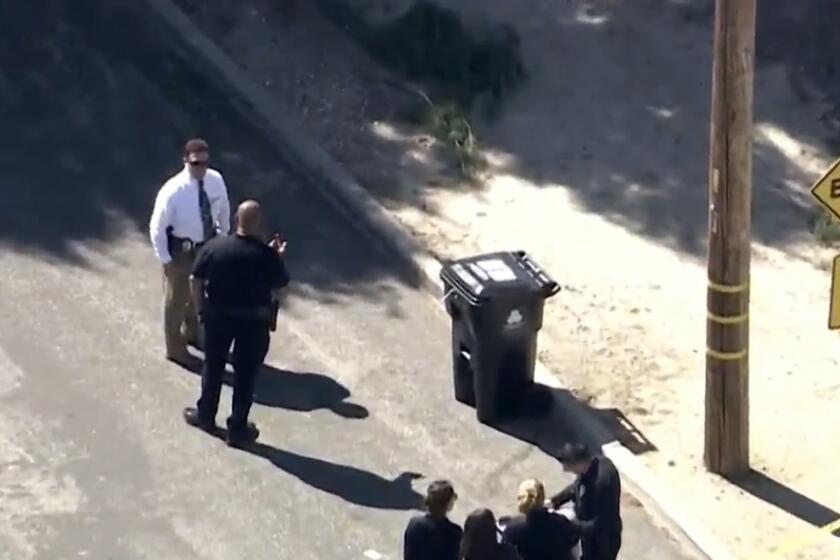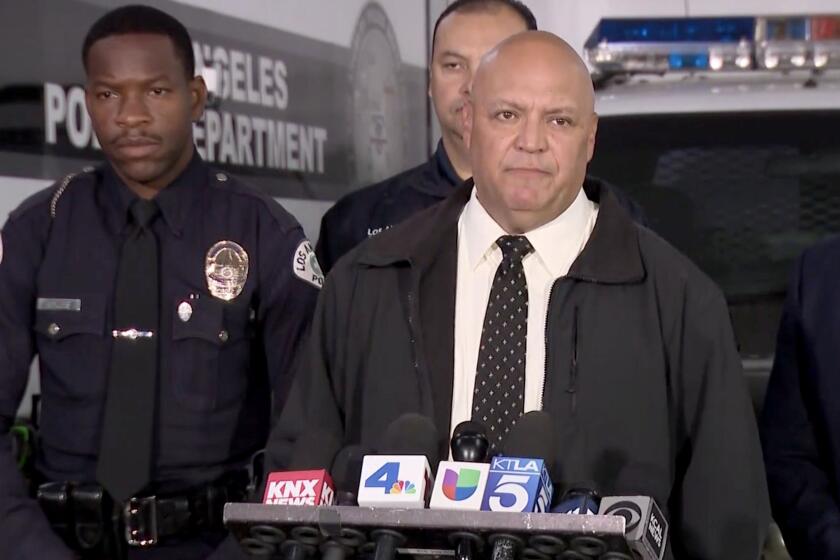Timeline: Here’s how the LAPD has transformed over the course of Charlie Beck’s career
LAPD Chief Charlie Beck spent his career in a department that has experienced radical change. Once compared to an occupying military force that violated the rights of minority residents, the department — after a series of black eyes — has emerged as an institution that even some longtime critics says is reformed and more respectful.
Here is a timeline of Beck’s years with the Los Angeles Police Department as reported in the pages of The Times.
EARLY DAYS
Entering force at difficult time
Beck became an LAPD cop 1977. It was a time of flux, as Chief Ed Davis stepped down and Daryl F. Gates, a hard-line LAPD veteran, took over. Davis had flirted with the idea that police should build close ties with the communities they serve, but under Gates the department shifted back to an entrenched, paramilitary mentality.
As a still-green patrol officer, Beck took assignments in the Rampart Division, South L.A., Hollywood and the Westside.
By the mid-1980s, with the crack cocaine epidemic in full swing and the city suffering a homicide rate three times what it is today, Beck had been promoted and was supervising cops in narcotics and anti-gang units in the thick of the chaos in South L.A.
With far too small a force to adequately police the city, heavy-handed, one-dimensional strategies prevailed, leading often to claims of excessive force and racism.
It was a time filled with troubling scenes. Beck recalled arriving at a house his gang officers had raided to find that children had been handcuffed and splayed on the street.
“They weren’t evil people ... they were doing what they were taught,” he said of the officers. “There was no room for independent thought.”
THE RIOTS AND BEYOND
A turning point in his thinking
The 1992 riots following the verdict in the Rodney King police beating case were a turning point for Beck, solidifying his feeling that the LAPD’s harsh policing methods not only were failing to make streets safer, but also helped set the stage for the eruption.
“I started trying to look at the job differently. I figured there had to be a way to be an effective police officer without alienating the people you were policing,” he said.
It would be a decade, however, before Beck found himself in a position to try out some of the ideas that had been taking shape in his head.
Soon after being hired as chief in 2002, William J. Bratton identified Beck, by then a captain in the department’s rough Central Division, as someone who he believed had potential.
He sent Beck to run the Rampart Division, which was still recovering from a corruption scandal, and tasked him with one of the high-profile assignments aimed at winning back some of the public’s confidence.
RISING TO THE TOP
Community outreach, and the top job
Bratton promoted him quickly, and Beck returned as a deputy chief to South Los Angeles, where he again had success balancing an aggressive stance on crime with the need to rebuild the trust of wary residents.
Civil rights leaders, attorneys and clergy who had clashed with police leadership over the years saw in Beck someone who wanted to hear them out. From there, Bratton brought Beck downtown to oversee the department’s expansive detective bureau and increasingly depended on him to handle high-profile crises.
When Bratton stepped down in 2008, Beck was selected to replace him.
TENURE AS CHIEF
Overseeing LAPD at a pivotal moment
Beck inherited a daunting fiscal situation when he became chief, and he earned respect as he guided the department through budget cuts that all but eliminated overtime cash and strained resources.
He has seen his own challenges as chief, however, including a stubborn uptick in crime that still lingers.
After a steady first term, Beck faced tough questions from police commissioners as they weighed his reappointment in 2014. On their list of concerns: his approval of the LAPD’s purchase of his daughter’s horse and a disciplinary system for officers that many felt was inconsistent and too lenient.
Most recently, Beck has led the LAPD during another transformational moment. Los Angeles has not been immune to the national outcry over how officers use force, particularly against black men. The city has seen protests over police shootings here and fierce criticism of the LAPD by some local members of the Black Lives Matter movement.
Like agencies across the country, the LAPD has worked to reduce shootings by officers through revamped training and policies, and rolled out new technology such as body cameras in hopes of building public trust.
Start your day right
Sign up for Essential California for news, features and recommendations from the L.A. Times and beyond in your inbox six days a week.
You may occasionally receive promotional content from the Los Angeles Times.



